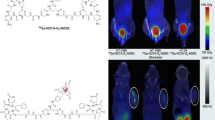Angiogenesis, the process of developing a new vessel, is an essential feature of the growth of solid tumors. For decades, the targeting of tumor angiogenesis has evolved into one of the most widely pursued therapeutic strategies in cancer research. Antiangiogenic drugs like bevaci-zumab, sunitinib, or sorafenib, were proved to be effective in many solid cancers such as colorectal cancer, renal cell carcinoma, hepatocelluar carcinoma, etc. But, these kinds of molecular targeted therapy are responsive only in selected patient population.
Access this chapter
Tax calculation will be finalised at checkout
Purchases are for personal use only
Similar content being viewed by others
Author information
Authors and Affiliations
Editor information
Editors and Affiliations
Rights and permissions
Copyright information
© 2010 Springer-Verlag Berlin Heidelberg
About this chapter
Cite this chapter
Kang, K.W., Jeong, J.M., Beer, A.J. (2010). Angiogenesis PET Using Radiolabeled RGD Peptides. In: Fanti, S., Farsad, M., Mansi, L. (eds) PET-CT Beyond FDG A Quick Guide to Image Interpretation. Springer, Berlin, Heidelberg. https://doi.org/10.1007/978-3-540-93909-2_12
Download citation
DOI: https://doi.org/10.1007/978-3-540-93909-2_12
Publisher Name: Springer, Berlin, Heidelberg
Print ISBN: 978-3-540-93908-5
Online ISBN: 978-3-540-93909-2
eBook Packages: MedicineMedicine (R0)




